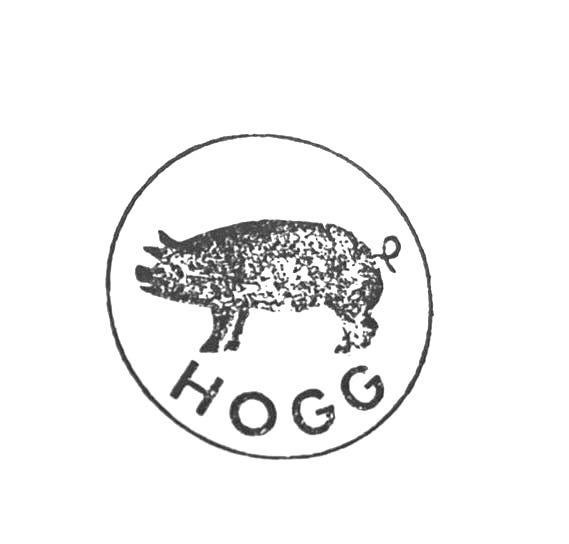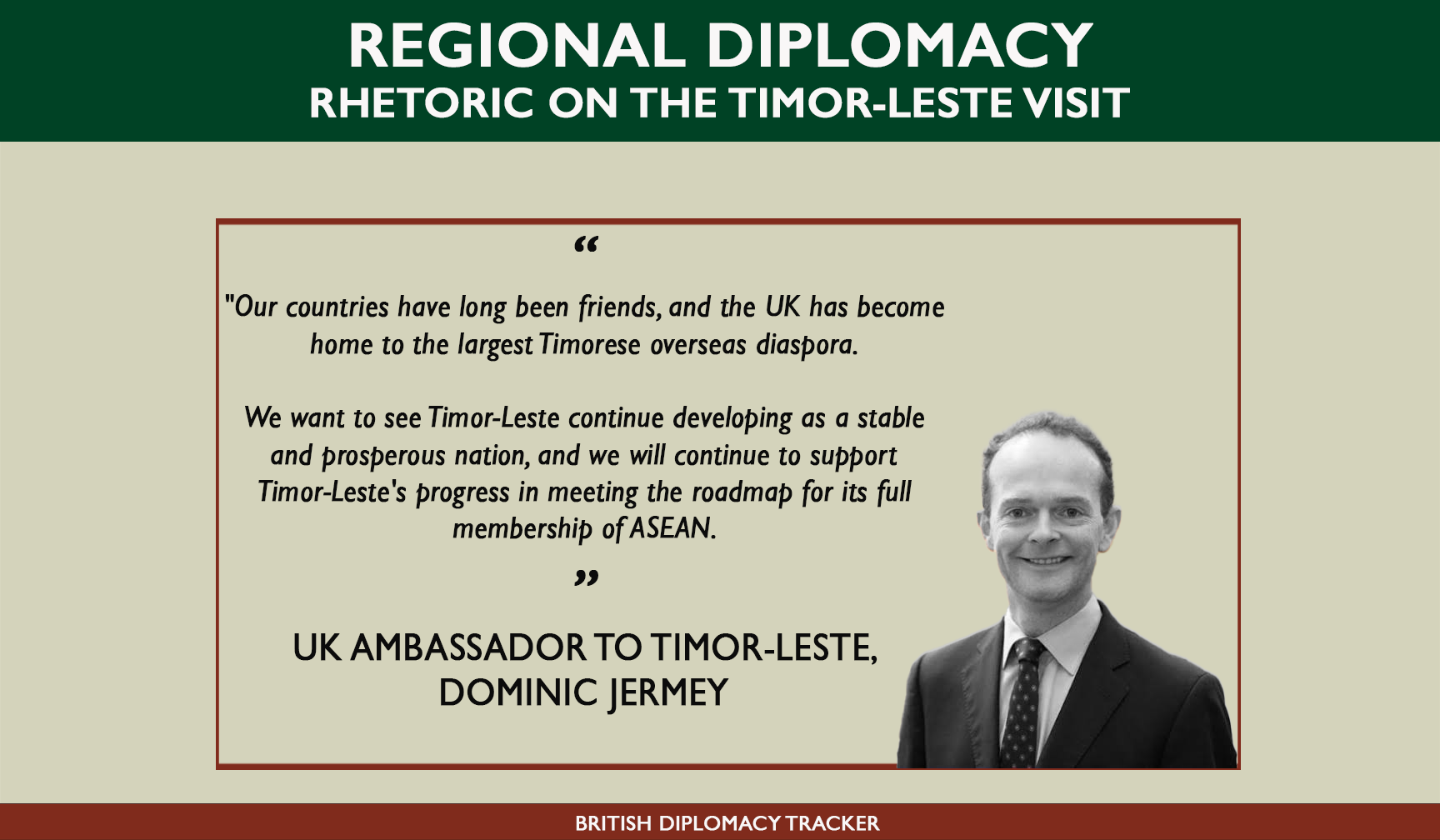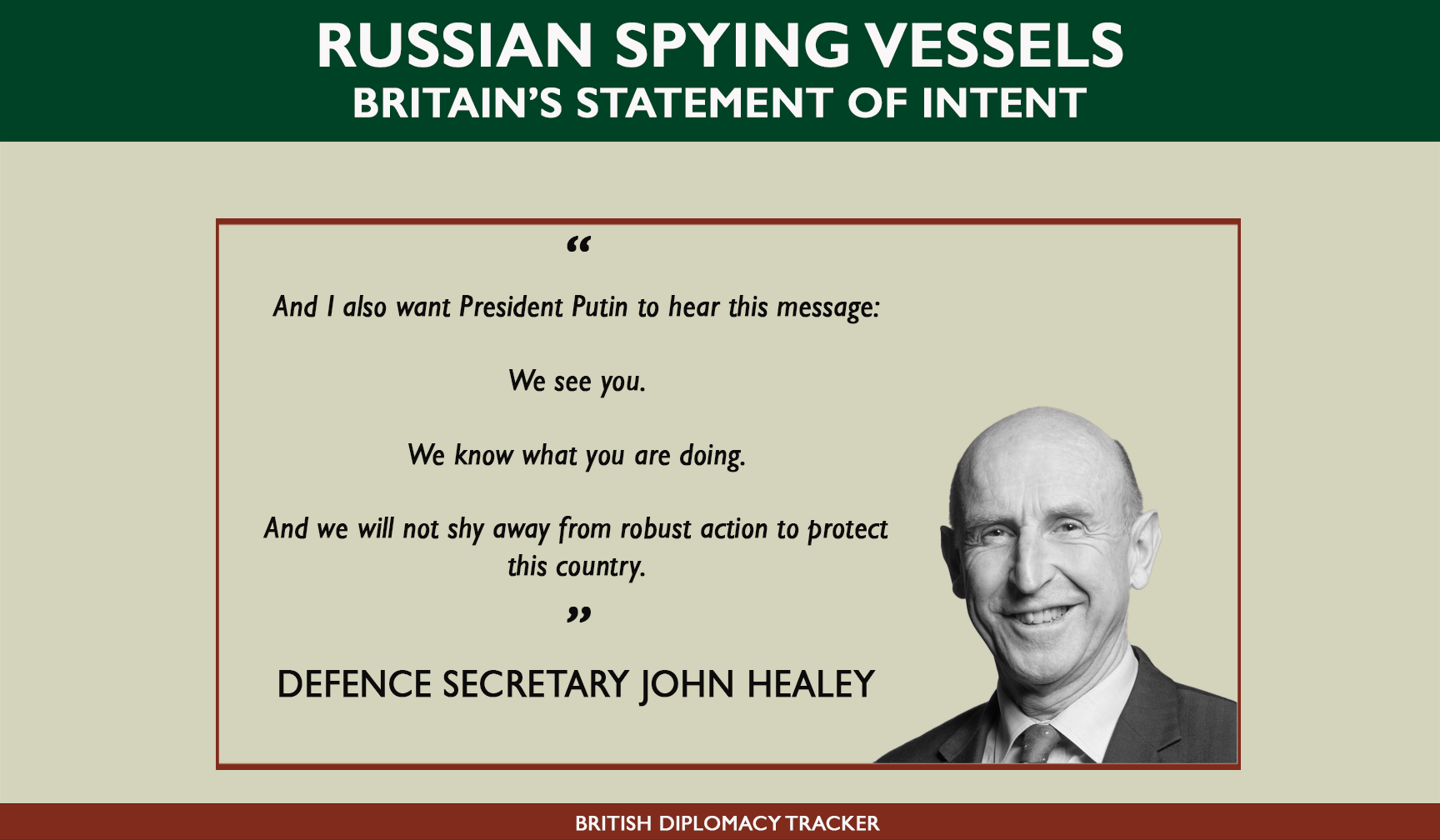Telegram 007
Sam Hogg's British Diplomacy Tracker
Hello,
On a dry, cold spring day some 2,400 years ago, a young writer in Athens sat on the highest rungs of the theatre, watching through his fingers as his play debuted. Glancing around the audience to see who laughed at what jokes, he will have washed down his fear with warmed spiced wine and dates as his comedy begun. Centred around the titular character Lysistrata, an Athenian woman who devises an audacious plan to bring it to an end, Aristophanes' play was a comedy set against the backdrop of the all-consuming Peloponnesian War.
For two decades, this brutal and expensive war had raged between his native Athens and nemesis Sparta, two powerful city-states fighting for hegemony across Greece and the surrounding region - almost the entirety of his known civilized world.
To bring peace, Lysistrata formulates a plan: a sex strike. Our hero convinces women from various Greek city-states to withhold sexual privileges from their husbands and lovers until peace is negotiated. Queue much male wailing, lots of phallic puns, and some slapstick humour, and lo, a ceasefire is finally brought about.
As with the best comedies, Lysistrata illustrates a key concept in any human being’s arsenal: leverage. Understanding leverage is also critical for a state, and with the return of Donald Trump, we’re going to see which world leaders truly understand its power. After all, Mr Trump is a dealer at heart and in his own words.
For the British Government, this represents a significant philosophical difference from its own worldview. Prime Minister Keir Starmer and Foreign Secretary David Lammy are lawyers, brought up to respect, enforce and preach the rule of law and international norms. Things should be ‘fair’, because that’s the way the world has worked since World War II, and that’s the basis of the international rules-based systems they observe. That, alas, is not a Trumpian approach. The Chagos Islands debacle will be the first of many friction points between London and Washington, as the former attempts to become more transactional in its approach to world affairs vis a vis the latter. It’s time to rediscover leverage and get back into the art of dealmaking.
— Sam Hogg (come and say hello)
Keir Starmer, Britain’s Prime Minister, sent words of welcome to President Donald Trump on his inauguration day. The United States held back punitive tariffs on Britain, for the moment.
John Healey, the Defence Secretary, issued a Parliamentary statement and warning to Moscow after a Russian spy ship was tracked off Britain’s coast.
Rachel Reeves, the Chancellor, visited Davos in Switzerland to attend the World Economic Forum meeting. Said Reeves: “I will not rest until the UK economy is growing and this government is delivering on its Plan for Change, so we can put more money in people’s pockets. The time to invest in Britain is now.”
Wes Streeting, the Health and Social Care Secretary, visited India. He signed a major health and life sciences agreement. In London, Minister for Trade Policy Douglas Alexander hosted Indian High Commissioner Vikram Doraiswami. They discussed the resumption of India - UK FTA negotiations and ways to strengthen trade & economic ties more broadly.
Catherine West, Minister for the Indo-Pacific, visited Indonesia and Timor Leste. Her trip was primarily focused on clean energy and environmental matters, including new commitments to tackling illegal fishing - a topic of major concern in the region.
Lord Coaker, a Defence Minister, visited Nigeria. His trip was aimed at reinforcing British support for Nigeria’s ongoing efforts against various terrorist groups operating in the state, among other defence-themed issues.
Tulip Siddiq, the former Anti-Corruption Minister who resigned last week, was reported to be under further investigation by Bangladesh’s Anti-Corruption Commission over luxury vacation homes in the country.
1. Who’s afraid of the Donald
On Monday, Donald Trump returned to the White House. Days before Trump returned, Britain’s Ambassador hopeful, Peter Mandelson, published an op-ed in Fox. Mandleson’s yet to be confirmed as the Ambassador, and media reporting - aided by people falling over themselves to brief negatively and often anonymously about him - goes back and forth about whether Trump will reject him. Regardless, the Ambassador hopeful argued that there were three areas Britain and the United States could deepen their working relationship:
Economic growth: Mandelson argued that cross-nation business ties, building more jobs and investment both ways could make both countries’ voters feel better off
National Security: he specifically noted that both Westminster and Washington should make sure Iran will never receive nuclear weapons and vaguely mentions China (this is one of the weakest points for the Ambassador hopeful, and one Trump’s administration may not like)
Foreign policy realism: Mandelson attempted to place the UK as the USA’s partner of choice in forcing NATO nations to pay their fair share on defence
Quoted
“Trump’s great skill as a political campaigner is to tap into sections of an electorate that feel unheard. Having been at the core of three winning UK election campaigns, I know well that this ability to build such a coalition across the country is the holy grail and key to political success.”
Peter Mandelson, Britain’s Ambassador to the United States, writes for Fox News
In Washington DC, a flurry of Executive Orders saw the President move to remove America from multilateral organisations and treaties, including the Paris Climate Agreement and the World Health Organization. Conceringly, the President signed an EO to reverse various commitments placed on frontier artificial intelligence companies compelling them to share the results of safety tests they had undertaken on new models. In normal human talk, that means the handful of companies producing AI at the cutting edge won’t have to share their homework with the government to make sure they’re doing those experiments safely.
As is tradition, Britain’s Prime Minister did not attend the inauguration (although former Prime Minister Boris Johnson did, as well as a handful of British politicians, at whose invitation remains unclear). Keir Starmer will likely meet Trump in the coming weeks, where issues such as Chagos will likely feature on the agenda. Defence will also be mentioned, as Trump continues to criticise NATO countries for not increasing their overall defence spend as a % of GDP - Starmer’s government is one that has signalled but not actioned an increase to at least 2.5%.
Thanks to some natural conditions, such as its size and population, and some manmade issues, like chronic underinvesting in key sectors, a weakened economy, and a lack of strategic clarity and autonomy, Britain sits downstream of many decisions made in Washington. The question for policymakers in Westminster now is twofold: how many decisions, and how badly exposed? The coming weeks and months will reveal much, but in the meantime, here are three themes I would watch:
AI leadership: The UK currently holds a world-leading role as an AI Safety power. In simple terms, this is because the previous government made it a priority, launching an institute and hosting a global summit on the issue attended by the two major powers - the United States and China. On Thursday, the President signed an EO giving his top team 180 days to submit an AI action plan on how the USA can sustain global AI dominance. Britain and those in the AI safety space will be watching closely.
Tariffs and free trade: Early rhetoric from Trump has avoided mentioning Britain as a focus of his incoming tariffs. However, concerns still linger around Westminster that second-order impacts could hit Britain’s economy.
China: One of the more contentious areas between the United States and Britain could prove to be how each approaches China. Contrary to some of his own advisers, Trump’s comments towards Beijing seem to imply a level of eagerness to work together on issues he deems important to Washington’s interests. For example, Trump told the Davos crowd this week he has “always had a great relationship” with Chinese President Xi Jinping and that he looks forward to “getting along with China.” That being said, anonymous briefings have been flowing, with one White House source telling an outlet “It seems the Starmer government is flirting with China as a fallback for a relationship with the US. Nobody here is buying it; it’s completely ridiculous and undermines the British government’s position.” Again, Britain will be watching to see how it formulates its approaches, which both toe the line to Washington and give the country space to have some level of autonomy.
2. Ministers on the move
Two strategic trips took place this week, away from the limelight of the Westminster bubble. Catherine West, Minister for the Indo-Pacific, spent her week in Indonesia and Timor Leste talking climate change and illegal fishing. Meanwhile, Lord Vernon Coaker, a Defence Minister, was in Nigeria, meeting counterparts to discuss defence collaboration. Both trips are worth unpacking.
West, one of the few Parliamentarians who speaks Mandarin having spent teaching in Nanjing, China in the 1990s, arrived in Jakarta early in the week. Her visit marked the first ministerial trip to Indonesia since President Prabowo Subianto’s state visit to Britain at the end of 2024. Talking points and priorities included finding commercial opportunities for British businesses in climate and infrastructure. For Downing Street, this allowed a strategic communications dovetail into the domestic growth agenda set out in the ‘Plan for Change’ whilst also ticking Foreign Secretary David Lammy’s stated aim to restore Britain’s ‘global leadership on climate’.
Noted
In Jakarta, West agreed a Memorandum of Understanding (MoU) with Minister for Digital Communications Meutya Hafid to provide a foundation for increased cooperation on areas from emerging technologies and AI to combating online disinformation.
To this end, West announced the Climate and Ocean Adaptation and Sustainable Transition (COAST) Programme Indonesia, part of the wider Blue Planet Fund. This will provide technical support and project funding worth £18m to protect ocean habitats and resources including promoting sustainable fishing. Illegal fishing is an area often overlooked by Westminster but one that features at length in regional diplomacy and friction. Forecasters should have the potential for escalation around illegal fishing as an issue of concern on their radars.
Quoted
“The UK and Indonesia are proving that strong economic growth does not need to come with higher emissions.”
Catherine West, Minister for the Indo-Pacific
For Indonesia, Britain is just one of several foreign countries looking to cash in on Jakarta’s push for 8% annual growth. British engineering expertise has already been deployed on Jakarta’s Mass Rapid Transit and Light Rapid Transit railway systems, and the British Government is hoping to replicate that success in the climate sector. Bilateral trade currently sits in the region of around £3bn, although it has dipped in recent quarters. While in town, West attended an ASEAN meeting - the UK is entering its fourth year as a Dialogue Partner to this grouping.
In Timor Leste, one of the world’s poorest countries, the Minister reaffirmed Britain’s support for its ongoing efforts to join ASEAN, and looked at more environmental projects. Last year Britain announced plans to open an embassy in Dili, and much of the bilateral engagement tends to focus on humanitarian programmes.
Noted
Timor Leste’s second largest source of income is from money sent back by its diaspora in the UK.
Several thousand miles away in in Abuja, Lord Coaker’s first visit to Nigeria saw him meet defence and security officials, including Minister of Defence, H.E. Mohammed Badaru, and President of the ECOWAS Commission H.E. Omar Touray. ECOWAS is the Economic Community of West African States, totalling 15 nations aimed at promoting economic engagement.
Britain has a long-lasting defence partnership with Nigeria, which includes working with Lagos to modernise its defence, cooperating on tackling Islamic State West Africa (ISWA) and Boko Haram, and joint cooperation on maritime security in the Gulf of Guinea.

3. Moscow must-go
For the second time in recent months, the Russian spy ship Yantar entered British waters. While it technically obeyed international maritime rules, the British Government believes it is doing so as part of a wider campaign to gather intelligence on British undersea critical infrastructure, such as undersea cables.
Defence Secretary John Healey responded in several ways. First, he amended the Royal Navy’s Rules of Engagement so British warships could get closer and better track the Yantar. To this end, RAF maritime patrol aircraft, alongside HMS Cattistock, HMS Tyne, and RFA Proteus, were deployed on tracking duties. Second, he ordered a British submarine shadowing the vessel to surface close to the Yantar “to make clear that we had been covertly monitoring its every move.” Speaking to MPs, Healey concluded by stating “Russian aggression will not be tolerated, at home or in Ukraine.”
Quoted
“My message to President Putin is clear. We know what you are doing, and we will not shy away from robust action to protect Britain.”
Defence Secretary John Healey
The defence of undersea telecommunications and energy cables - home to some 99% of global internet traffic - has become a priority issue for many Western European nations. To this end, Britain has sought to carve a role for itself within NATO as leading and supporting the protection of these cables. For example, the Royal Air Force will provide aircraft to Baltic Sentry activity, a new NATO deployment designed to strengthen the protection of offshore infrastructure in the Baltic Sea, and the Government has bought a specialist vessel with a wide range of useful capabilities. With appropriate timing, Parliament’s National Security Strategy Committee launched an inquiry to understand further just how vulnerable Britain’s underseas cables are.
Noted
Around 60 cables connect the UK to the outside world. Over 50 Russian vessels have been observed around areas of high cable density in the Baltic Sea.
UN SECURITY COUNCIL
Ambassador James Kariuki, UK Deputy Permanent Representative to the UN, delivered a statement at the UN Security Council meeting on cooperation between the UN and the League of Arab States.
The UK condemned the violence between the ELN and EMBF in Colombia.
The UK delivered a statement emphasising it is committed to working with African partners to build resilience against threats from terrorism.
DEFENCE
Rolls Royce announced a major deal, worth approximately £9 billion, to bolster support to the Royal Navy’s fleet of nuclear submarines.
FOREIGN AFFAIRS
Keir Starmer, the Prime Minister, spoke separately to the Amir of Qatar His Highness Sheikh Tamim bin Hamad Al Thani and Danish Prime Minister Mette Frederiksen.
David Lammy, the Foreign Secretary, visited Cairo to discuss regional issues.
Diplomatic relations between Britain and Mongolia were established 50 years ago, on 23 January 1963.
Lord Collins welcomed a Parliamentary delegation from the Solomon Islands.
SOFT POWER
UK Export Finance signed a multimillion-dollar contract with the Jamaican Government to replace or upgrade 55 bridges across Jamaica.
The British High Commission in Sri Lanka paid for members of the Sri Lanka Armed Forces and Maldives National Defence Force to participate in a course on Managing Defence in the Wider Security Context.
Noted
Saudi Arabia is to finance a bridge construction project in Sri Lanka’s eastern district of Trincomalee. It has helped finance over a dozen projects in Sri Lanka, covering education, water, energy, health and infrastructure.
TRADE
Matthew Pennycook, a Housing Minister, said Britain is not "currently" looking to join a pan-European customs agreement as part of the government’s post-Brexit “reset” with the EU.
Louise de Soura, Ambassador to Chile, visited a mine to promote trade between UK and Chilean companies in the areas of energy, mining and infrastructure after the UK's entry into CPTPP.
AI AND EMERGING TECH
The third Ministerial Japan-UK Digital Council took place. It discussed matters from compute to semiconductors.
ECONOMY AND AID
Vodafone launched a new project in Georgia.
Mark Lowcock, the longest-serving Permanent Secretary of the old Department for International Development was interviewed by CSW.
IMMIGRATION AND DIASPORA
Pakistan’s Spokesperson for the Ministry of Foreign Affairs on Monday noted “with deep concern the increasingly racist and Islamophobic political and media commentary in the United Kingdom that was aimed at conflating the reprehensible actions of a few individuals with the entire 1.7 million British Pakistani diaspora.”
DIPLOMATS
Daniel Shepherd has been appointed His Majesty’s Ambassador to the Republic of Guinea in succession to Mr John Marshall.
Simon Martin, Ambassador to Morocco, met the Transport Minister to discuss potential collaboration on infrastructure projects.
Robert Dickson, Charge d’Affaires of the UK Mission to Afghanistan, met Taliban officials to push for British interests.
Following a disastrous session a fortnight or so ago, Shein has responded to demands for further evidence from Parliament’s Business and Trade Committee. In a 12-page letter, which looks like it was crafted by a team of lawyers, the Singaporean/Chinese e-commerce giant dodged straight answers to most of the questions Committee Chair Liam Byrne had set out in his original letter.
Noted
Peter Mandelson’s company, Global Counsel, advised Shein for long periods recently too.
The ongoing case presents an interesting geopolitical and growth issue for Britain. Shein withdrew from listing in New York (providing no details as to why in its letter, despite being asked), and has instead been courted aggressively by successive British administrations to list on the London Stock Exchange. Britain desperately needs more IPOs, but the case has raised concern among human rights activists over Shein’s record.











